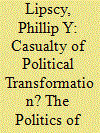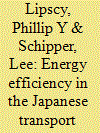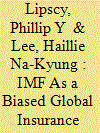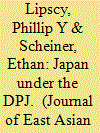|
|
|
Sort Order |
|
|
|
Items / Page
|
|
|
|
|
|
|
| Srl | Item |
| 1 |
ID:
117077


|
|
|
|
|
| Publication |
2012.
|
| Summary/Abstract |
The Democratic Party of Japan (DPJ) came to power in 2009 promising significant transportation sector reform, but it has struggled to implement its proposals. I argue that the DPJ's initiatives faltered due to the legacy of "efficiency clientelism." Historically, Japanese transportation policy combined two imperatives: (1) encourage efficiency by raising the cost of energy-inefficient transportation, and (2) redistribute benefits to supporters of the incumbent Liberal Democratic Party (LDP). Because of the legacy of efficiency clientelism, DPJ campaign pledges-designed to appeal broadly to the general public by reducing transportation costs- ran up against the prospect of sharp declines in revenues and energy efficiency. Efficiency clientelism was well suited to political realities in Japan prior to the 1990s, but recent developments have undercut its viability. This raises profound questions about the sustainability of Japan's energy efficiency achievements.
|
|
|
|
|
|
|
|
|
|
|
|
|
|
|
|
| 2 |
ID:
162518


|
|
|
|
|
| Summary/Abstract |
Existing scholarship attributes various political and economic advantages to democratic governance. These advantages may make more democratic countries prone to financial crises. Democracy is characterized by constraints on executive authority, accountability through free and fair elections, protections for civil liberties, and large winning coalitions. These characteristics bring important benefits, but they can also have unintended consequences that increase the likelihood of financial instability and crises. Using data covering the past two centuries, I demonstrate a strong relationship between democracy and financial crisis onset: on average, democracies are about twice as likely to experience a crisis as autocracies. This is an empirical regularity that is robust across a wide range of model specifications and time periods.
|
|
|
|
|
|
|
|
|
|
|
|
|
|
|
|
| 3 |
ID:
121282


|
|
|
|
|
| Publication |
2013.
|
| Summary/Abstract |
We examine energy efficiency in the Japanese transportation sector since the 1970s. Comparisons with the United States and other developed economies illustrate that Japan primarily stands out due to low activity levels and modal structure rather than modal energy intensity. On-road automobile energy intensity has shown little improvement, albeit from a low base, over the past four decades. We also consider policy measures undertaken by the Japanese government. Political arrangements in Japan after World War II made it attractive for politicians to pursue energy conservation by making transportation, particularly by automobile, expensive for the average Japanese citizen. The revenues raised from various fees and taxes on automobile transportation were redistributed to core supporters of the ruling Liberal Democratic Party. These political arrangements have come under fire in recent years, calling into question Japan's traditional approach towards transportation sector energy efficiency.
|
|
|
|
|
|
|
|
|
|
|
|
|
|
|
|
| 4 |
ID:
165158


|
|
|
|
|
| Summary/Abstract |
A large literature has established that the International Monetary Fund (IMF) is heavily politicized. We argue that this politicization has important consequences for international reserve accumulation and financial crises. The IMF generates moral hazard asymmetrically, reducing the expected costs of risky lending and policies for states that are politically influential vis-à-vis the institution. Using a panel data set covering 1980 to 2010, we show that proxies for political influence over the IMF are associated with outcomes indicative of moral hazard: lower international reserves and more frequent financial crises. We support our causal claims by applying the synthetic control method to Taiwan, which was expelled from the IMF in 1980. Consistent with our predictions, Taiwan's expulsion led to a sharp increase in precautionary international reserves and exceptionally conservative financial policies.
|
|
|
|
|
|
|
|
|
|
|
|
|
|
|
|
| 5 |
ID:
165172


|
|
|
| 6 |
ID:
117073


|
|
|
|
|
| Publication |
2012.
|
| Summary/Abstract |
In 2009, the Democratic Party of Japan (DPJ) brought an end to the long reign of the Liberal Democratic Party (LDP). However, despite high expectations, this politically transformative event has not unleashed significant policy change in Japan. We highlight five electoral factors that have acted as important constraints on policy change under DPJ rule. First, majoritarian electoral rules have led to a convergence in the policy positions of the two major political parties. Second, as the parties' policy positions have become more similar, voters have increasingly cast ballots based on "valence" (i.e., nonpolicy) evaluations. Third, large national vote swings have limited the tenure of young, inexperienced candidates who might otherwise serve as the instigators of reform. Fourth, Japan's electoral rules permit inconsistency across policy positions within parties and discourage greater policy coherence. Fifth, the continuing influence of rural regions has limited the scope of policy reform under the DPJ.
|
|
|
|
|
|
|
|
|
|
|
|
|
|
|
|
|
|
|
|
|